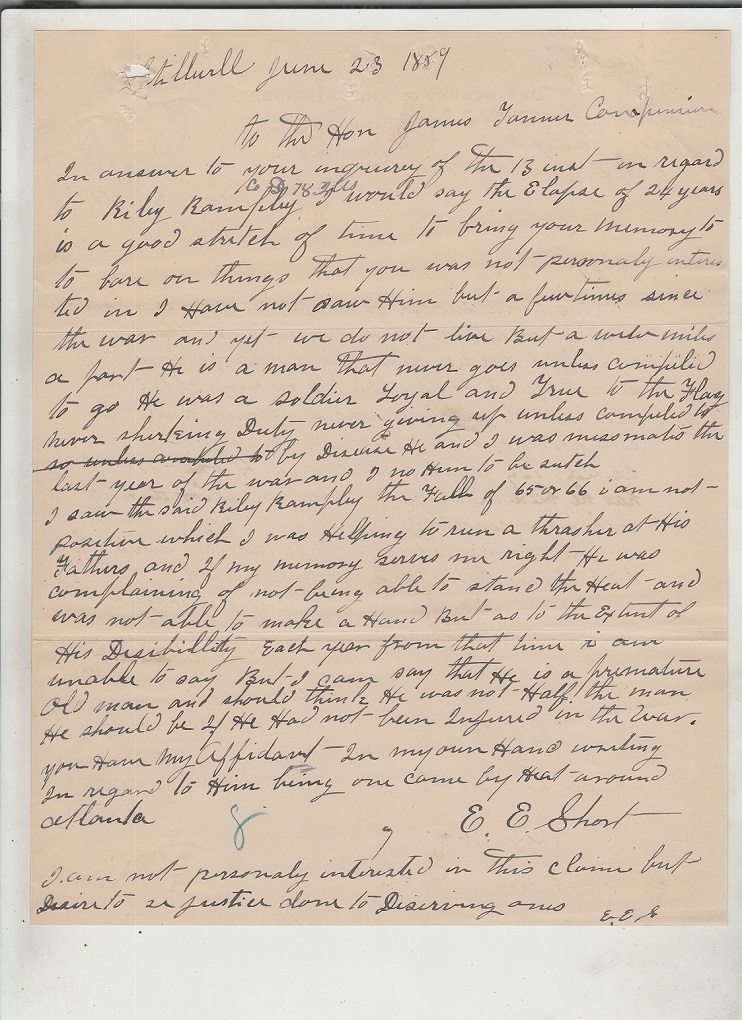The Pension Department contacted Eli Short in 1889 as a part of their investigation into the pension claim of Riley Rampley. Short responded in his own hand a few days later and the letter appears in Rampley’s pension file. Short was not the only comrade of Rampley’s that was contacted by the Department.
It’s a little unclear on the original, but the letter is written on the reverse side of an apparently standard inquiry form dated 13 June 1889 and directed to Eli Short in Stillwell, Illinois. The inquiry from the Commissioner of Pensions wanted Short to address Rampley’s health since the war.
Short letter indicated that he served with Rampley in the Civil War and that they were messmates for a time. Short mentions in his letter that
24 years is a good stretch of time to bring your memory to things that you was not personaly interested in
That’s a really nice way to phrase it.
Short goes on to mention that while he lived within a few miles of Rampley he had seen him few times since the war. One of those times was apparently in the fall of 1865 of 1866 when Short was helping Riley and Riley’s father with the threshing. Riley really was not worth a hand then. Short later goes on to say that Riley was a premature old man.

Letter from Eli Short, 23 June 1889, Stillwell, Illinois, to James Tanner, Pension Commissioner, Civil War Pension file of Riley Rampley, 78th Illinois Infantry, Co. D.
Riley was a soldier “loyal and true to the Flag” and never shirked his duty, according to Eli. He did qualify this by saying that disease was the only thing that might cause Riley to be unable to fulfill his duties.
Short’s postscript included the standard “I’m not personally interested in this claim” verbiage that permeates pension affidavits given by witnesses. Squeezed in at the very bottom is Short’s statement that he desires to see justice done to deserving ones.
Affidavits, statements, and letters from witnesses pension files typically address some issue or concern the pension office had. Short was addressing Riley’s health since the war. The beauty of these statements written by neighbors, comrades, and other non-medical staff is that they very easily can contain off-the-cuff details that have relevance beyond the health of the pensioner.
- We learn that Riley and Eli served together.
- We learn that Riley’s father lived in the general Stillwell area.
- We learned that Riley’s father was alive in 1865-1866.
- We learned that not all near neighbors interacted with each other on a regular basis, even in rural areas.
- We learned that Riley’s father was a farmer.
Some of those things we may have already known. Some we may have not. Some may be really helpful to our research and some may not. It just depends on what we know and what we don’t.
Note: “Thresh” is spelled as “thrash” in the title to this post as that’s the only way I ever heard it pronounced and is how Short spells it in his letter. I don’t know that the Rampleys and Shorts said it that way,

2 Responses
Dad said Thrash too. And in fact that is what I’m most likely to say. So the three of us must be ‘right’. 😎
I never heard it said any other way. By the time I was around, “thrashing” was no longer done as it was back in the day, but the word lingered.